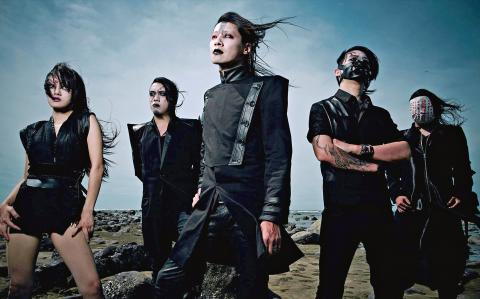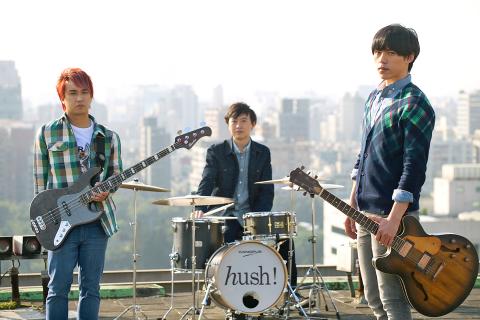“True beauty is something that attacks, overpowers, robs and finally destroys.” So said Japanese writer, nationalist, possible psychotic and seppuku enthusiast Yukio Mishima.
There has been much beauty to witness in Taiwan of late, within the music scene and without. Within the scene, shows witnessed by this writer in recent weeks have had an energy about them previously found lacking — an energy that is perhaps mirrored in society at large.
That uptick in something that, for lack of a better word we’ll call spirit, could have something to do with the political arena.

Photo courtesy of Chthonic
January’s general elections seemed to usher in a sweeping change of the prevailing voice across the country with the resounding victory of Democratic Progressive Party (民主進步黨) presidential candidate Tsai Ing-wen (蔡英文).
Taipei’s fifth district even elected the nation’s first bona fide metal head politician to the Legislature when it chose Chthonic’s (閃靈) Freddy Lim (林昶佐) to represent it over a heavily entrenched incumbent.
All beautiful things. Attacking the ghosts of the past head on, overpowering the old guard, robbing the establishment of the voice it had stolen from the once quietly seething majority, destroying tenets held sacred too long.

Photo courtesy of Re:public Records
This weekend, the celebration of the melding of music and politics will continue at Megaport (大港開唱) in Kaohsiung. The festival, organized by a group headed by Lim, will see over 70 bands take to multiple stages over its two-day run, alongside speaking engagements presided over by Lim and other figures from the political and activist arenas.
Starting out in 2006, the festival has seen its ups and downs, much like the man now heading up the occasion and his band. Now, all seem to be in confluence.
Tomorrow’s highlights will include the aforementioned Chthonic, not least of which for the fact that speculation has run rife that Lim’s political career could see the band’s performance schedule somewhat curtailed over the next four years.
For Lim’s part, he has stated that the band will continue touring, and a new album could see the light of day as soon as next year.
Another band to look out for is Taipei snot-nosed punk/metal protagonists The Roadside Inn. The band’s high-energy live shows and in-house DIY work ethic have quickly elevated the group over and above many of their peers in just a few short years. If you happen to be anywhere near the first three rows, watch out for front man Zoie Liao’s frequent stage dives.
Preeminent Taiwanese Brit/indie rock group 1976 will also return to the stage tomorrow night. The Golden Melody Award-winning band marks its 20th year, passing the two-decade mark no mean feat in a country where the prevailing social constructs and culture eat most bands for breakfast.
Moving to Sunday, fans of the heavy stuff will no doubt be circling the time slot of Taipei melodic thrash band Infernal Chaos. The band has been somewhat quiet in recent years, with only sporadic appearances here and there due to guitarist and founder Jesse Liu’s (劉笙彙) heavy commitments in Chthonic.
With Lim now politically indisposed, perhaps Liu’s other perennial fan favorite will return to a more regular gigging regiment. Expect furious action in the pit for this one.
For something just slightly softer, pop rock band Hush will also take to the stage on Sunday. The band, led by singer/songwriter Hush Chan (陳家偉), attracted the public’s attention in 2013 when the video for their track Lovers In The Sky featured what could well have been the first same-sex love story in Taiwan music industry history.
The song and video played a part in cementing Taiwan as perhaps the most progressive country in Asia when it comes to acceptance of the fact that, hey, some people are straight, some are gay, and we should all just get over it.
Indie rock, art folk and alternative country are all descriptors that have been used to describe another of Sunday’s featured artists, The Tic Tac. Perhaps it’s best that you just take in the performance and decide for yourself what to call their thoughtful and soulful take on the wide-spanning indie genre.
And for another dose of heavy that is itself heavily influenced by the political maelstroms perpetually swirling in and around Taiwan, check out Burning Island (火燒島). The Tainan thrashers mix old-school meets new thrash riffs with a heavy dose of Taiwan pride.
Another fitting addition to a fest coming into its own at a timely moment in the life of the scene, and that of the country at large.
■ Megaport takes place tomorrow and Sunday at Kaohsiung’s Pier-2 Art Center (駁二藝術特區), 1 Dayong Rd, Kaohsiung City (臺灣高雄市鹽埕區大勇路1號). Tickets are NT$1,600 for two days, single day tickets NT$900, both available at 7-Eleven ibon kiosks, or online via Indievox.

That US assistance was a model for Taiwan’s spectacular development success was early recognized by policymakers and analysts. In a report to the US Congress for the fiscal year 1962, former President John F. Kennedy noted Taiwan’s “rapid economic growth,” was “producing a substantial net gain in living.” Kennedy had a stake in Taiwan’s achievements and the US’ official development assistance (ODA) in general: In September 1961, his entreaty to make the 1960s a “decade of development,” and an accompanying proposal for dedicated legislation to this end, had been formalized by congressional passage of the Foreign Assistance Act. Two

March 31 to April 6 On May 13, 1950, National Taiwan University Hospital otolaryngologist Su You-peng (蘇友鵬) was summoned to the director’s office. He thought someone had complained about him practicing the violin at night, but when he entered the room, he knew something was terribly wrong. He saw several burly men who appeared to be government secret agents, and three other resident doctors: internist Hsu Chiang (許強), dermatologist Hu Pao-chen (胡寶珍) and ophthalmologist Hu Hsin-lin (胡鑫麟). They were handcuffed, herded onto two jeeps and taken to the Secrecy Bureau (保密局) for questioning. Su was still in his doctor’s robes at

Last week the Democratic Progressive Party (DPP) said that the budget cuts voted for by the China-aligned parties in the legislature, are intended to force the DPP to hike electricity rates. The public would then blame it for the rate hike. It’s fairly clear that the first part of that is correct. Slashing the budget of state-run Taiwan Power Co (Taipower, 台電) is a move intended to cause discontent with the DPP when electricity rates go up. Taipower’s debt, NT$422.9 billion (US$12.78 billion), is one of the numerous permanent crises created by the nation’s construction-industrial state and the developmentalist mentality it

Experts say that the devastating earthquake in Myanmar on Friday was likely the strongest to hit the country in decades, with disaster modeling suggesting thousands could be dead. Automatic assessments from the US Geological Survey (USGS) said the shallow 7.7-magnitude quake northwest of the central Myanmar city of Sagaing triggered a red alert for shaking-related fatalities and economic losses. “High casualties and extensive damage are probable and the disaster is likely widespread,” it said, locating the epicentre near the central Myanmar city of Mandalay, home to more than a million people. Myanmar’s ruling junta said on Saturday morning that the number killed had